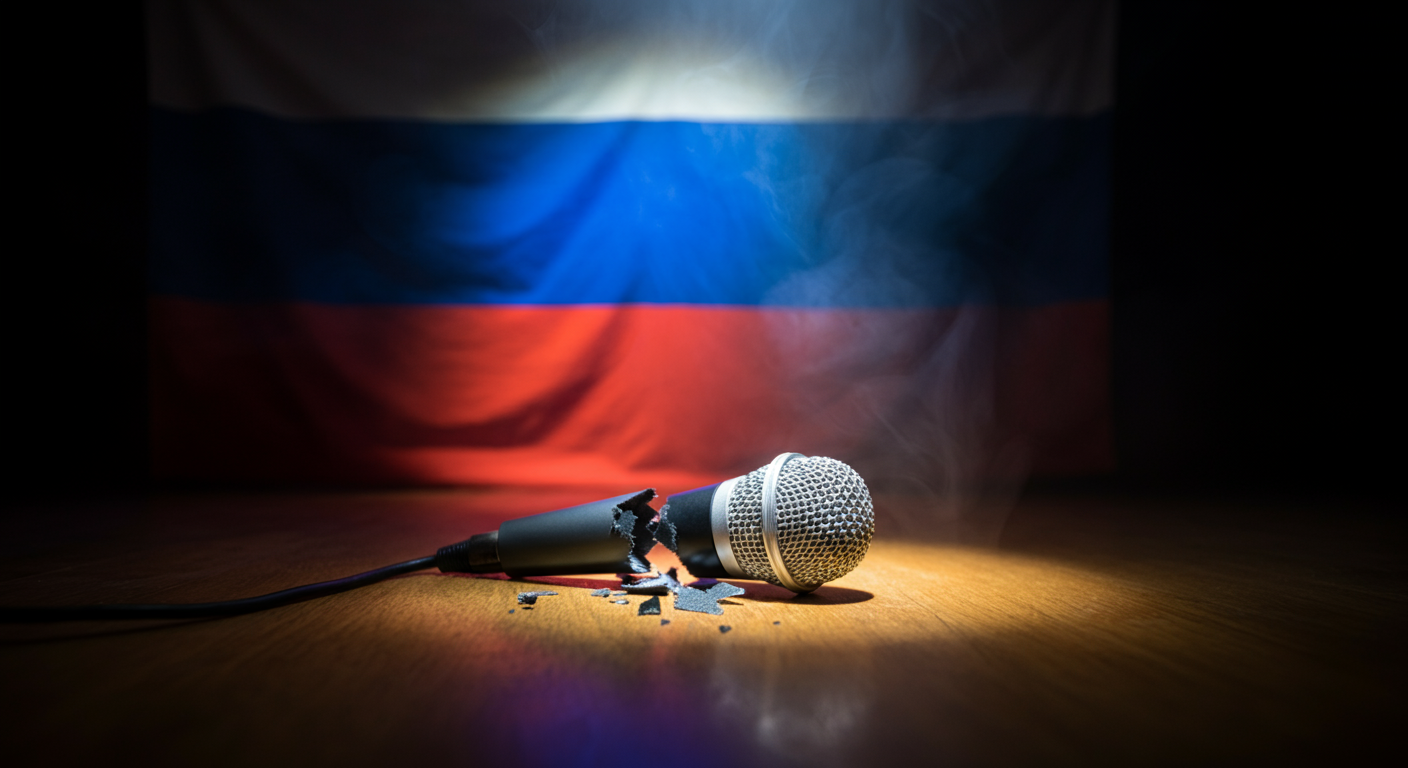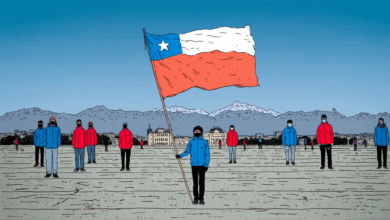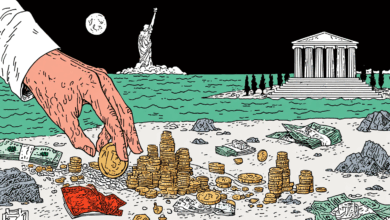International Relations on Stage

Before this year’s Eurovision song contest in Basel, Switzerland, 72 of the competition’s former participants signed an open letter calling for Israel to be banned from the 2025 edition. The letter accused the European Broadcasting Union (EUB), which runs the contest, of double standards for excluding Russian singers from 2022’s Eurovision, in response to Vladimir Putin’s invasion of Ukraine, while not imposing a ban on Israel. The letter specifically accused Israel of “genocide against the Palestinians in Gaza and the decades-long regime of apartheid and military occupation against the Palestinian people.”
The EUB refused to ban Israel, just as it did last year (though it made Israel change the title and lyrics of its 2024 entry, originally titled “October Rain,” which it said violated the contest’s commitment to political neutrality). Eurovision’s director Martin Green CBE said: “We are not immune to global events but, together, it is our role to ensure the Contest remains—at its heart—a universal event that promotes connections, diversity, and inclusion through music.” In the competition’s final on May 17, Israel’s Yuval Raphael, a survivor of the October 7th attacks, came second with “A New Day Will Rise”—a defiant, optimistic performance that won the public vote, though not the highest score from the jury.
Israel’s success didn’t silence the censors. Two days after the final, Spain’s Socialist prime minister Pedro Sánchez insisted that Israel should be banned from future editions, agreeing with the letter’s signatories that the EUB is guilty of hypocrisy. “Nobody was up in arms when the Russian invasion of Ukraine began three years ago and Russia had to leave international competitions and could not take part… in Eurovision. Therefore Israel shouldn’t either,” he said. But that’s not the unassailable syllogism Sánchez thinks it is. Arguably, the Russian ban doesn’t reveal Israel’s continued participation in Eurovision to be a mistake; rather, the EUB’s refusal to ban Israel for the last two years shows that it was wrong to exclude Russia in 2022.
Cultural or sporting bans are often lumped together with economic sanctions, but this is an error. The economic sanctions that have been imposed on Russia by the US, EU, and UK—such as freezing foreign currency reserves or banning imports of oil and gas and exports of potentially dangerous technology—are meant to reduce the country’s capacity for war. The efficacy of these sanctions is debatable, but they target the Russian state. Cultural and sporting bans, by contrast, have practically zero impact on a country’s government. They simply legitimize discrimination against individuals based on nationality. They are, in short, racist—despite hardly ever being condemned as such by those who claim to be passionate crusaders against racism.
It is partly for this reason that the EUB has been reluctant to impose such bans. In the immediate aftermath of the Russian invasion, despite objections from Ukraine’s state broadcaster, the EUB announced that it was planning to include both countries in that year’s contest, because Eurovision was a “non-political cultural event.” But 24 hours later, after UEFA decided to move the Champions League final from St. Petersburg to Paris, Formula 1 cancelled the Russian Grand Prix, and Estonia and Finland threatened to withdraw, the EUB banned Russia “in light of the unprecedented crisis in Ukraine.” The decisions taken by UEFA and F1 were understandable, as both events would have required participants to travel to a country that had just launched an illegal invasion. But Eurovision’s organizers didn’t have that problem (the 2022 finals were held in Turin, Italy). The EUB’s original stance—resting on a robust distinction between politics and culture, governments and citizens—was more in tune with the spirit of the contest.
The discriminatory nature of such sanctions was especially clear when Wimbledon banned Russian and Belarusian players from the tennis tournament in 2022. “This was an incredibly difficult decision,” the All England Lawn Tennis Club’s (AELTC’s) then-chairman, Ian Hewitt, announced sententiously: “[It was] not taken lightly or without a great deal of consideration for those who will be impacted.” But the only people affected were players unfortunate enough to have been born in Russia or Belarus—including top-ranked players such as Danil Medvedev (Russia) and Aryna Sabalenka (Belarus)—and the fans who wanted to see them play (although the ban did not apply to Russian-born players who were competing under another flag, such as Elena Rybakina who won the tournament playing for Kazakhstan). The AELTC failed to explain how punishing these two groups weakened the Russian war machine.
Despite its overt racism, the Wimbledon ban was supported by 69% of the British public (a sizable portion of which no doubt considers itself progressive). The British government also got involved, with the then-Conservative secretary for culture, media, and sport, Michelle Donelan, saying: “[S]port cannot be used to legitimize this deadly invasion, and… athletes representing the Russian or Belarusian states should be banned from competing in other countries.” But what would it even mean for a sporting event to “legitimize” an invasion? Danil Medvedev’s appearance at Wimbledon has nothing to do with Putin’s continued aggression toward Ukraine: it would be absurd to conclude from his presence on court that the AELTC supports the Russian invasion.
In 2023, the AELTC revoked the Wimbledon ban after being fined by the ATP and WTA, the organizations that run the men’s and women’s tours, respectively. Both bodies said that it was discriminatory and bad for the sport. Yet Wimbledon still required Russian and Belarusian players to sign neutrality declarations in order to compete. This was supposedly an improvement, but simply replaced nationality with political beliefs as an illegitimate basis for exclusion. Despite objecting to the 2022 Wimbledon ban, both the ATP and WTA still refuse to include national flags in the online profiles of Russian and Belarusian players, or to state their nationalities.
The International Olympic Committee (IOC) has been less subtle in its attempt to erase athletes’ nationalities. Ahead of the 2024 Paris Games, the IOC banned the Russian and Belarusian teams but allowed athletes from those countries to compete as AINs (the French acronym for Individual Neutral Athletes). After passing rigorous background checks, 15 Russians and 17 Belarusians competed in the Paris Games as AINs. However, they weren’t allowed a boat for the opening ceremony, and their national flags were forbidden from being displayed. A wordless anthem, commissioned specially by the IOC, was played when they mounted the podium. The five medals they took home, including a gold by Belarusian trampolinist Ivan Litvinovich, were not included in the games’ official rankings. These 32 AINs were present in Paris but also not—nominally included, but effectively airbrushed out of the proceedings.
Cultural and sporting bans foster division and negative stereotypes, while in no way diminishing a country’s capacity for aggression (unlike economic sanctions). It is not a sign of enlightened liberalism to ban Israeli, Belarusian, and Russian citizens from singing or competing in public. These measures have instead resulted in the toxic politicization of contests that celebrate artistic and athletic skill. The best way for the EUB to avoid double standards is not to ban Israelis from the 2026 edition of Eurovision, but to allow Russians back into a contest from which they should never have been excluded.
The post International Relations on Stage was first published by the Foundation for Economic Education, and is republished here with permission. Please support their efforts.



